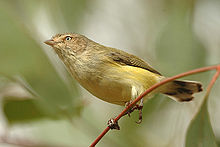Weebill
| Weebill | |
|---|---|

| |
| Scientific classification | |
| Kingdom: | |
| Phylum: | |
| Class: | |
| Order: | |
| Family: | |
| Genus: | Smicrornis Gould, 1843
|
| Species: | S. brevirostris
|
| Binomial name | |
| Smicrornis brevirostris (Gould, 1838)
| |
The weebill (Smicrornis brevirostris) is Australia's smallest bird at approximately 8 to 9 cm (3.1 to 3.5 in) long. It is an olive-yellow songbird with a grey bill, brown wings, pale yellow eyes and grey feet. Its tail feathers are brown with a black bar and white spot on the tip of all inner webs but the central pairs. The sexes are similar. The weebill is the only member of genus Smicrornis; gene flow is strong and local variation follows Bergmann's and Gloger's Rules.
The weebill is found in woodlands and forests throughout mainland Australia. The diet consists mostly of insects and larvae. The female usually lays two or three brown-speckled cream-colored eggs.
Widespread and common in its habitat throughout its range, the weebill is evaluated as Least Concern on the IUCN Red List of Threatened Species.
References
- Del Hoyo, J.; Elliot, A. & Christie D. (editors). (2006). Handbook of the Birds of the World. Volume 12: Picathartes to Tits and Chickadees. Lynx Edicions. ISBN 978-84-96553-42-2
External links
- BirdLife Species Factsheet
- Flickr Field Guide Birds of the World: Smicrornis brevirostris. Retrieved 2007-JUL-09.

